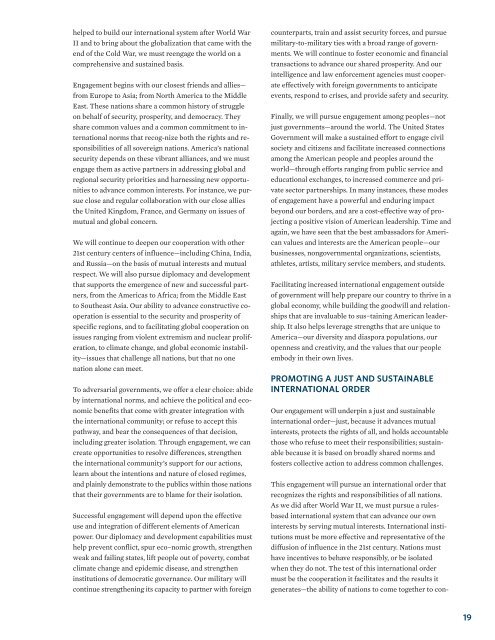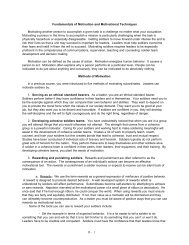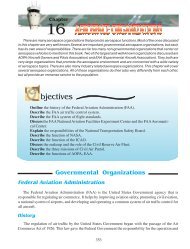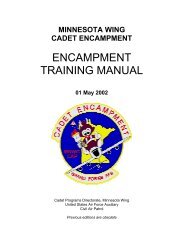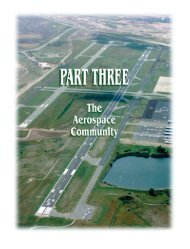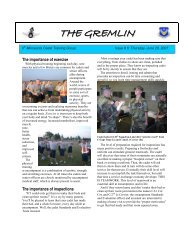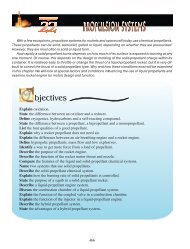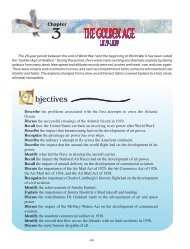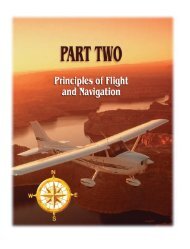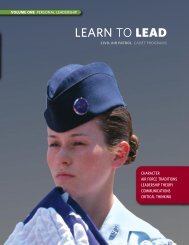within our borders has always been the source of ourstrength, and this is even truer in an age of interconnection.First and foremost, we must renew the foundation ofAmerica’s strength. In the long run, the welfare of theAmerican people will determine America’s strength inthe world, particularly at a time when our own economyis inextricably linked to the global economy. Our prosperityserves as a wellspring for our power. It pays for ourmilitary, underwrites our diplomacy and developmentefforts, and serves as a leading source of our influence inthe world. Moreover, our trade and investment supportsmillions of American jobs, forges links among countries,spurs global development, and contributes to a stable andpeaceful political and economic environment.Yet even as we have maintained our military advantage,our competitiveness has been set back in recent years. Weare recovering from underinvestment in the areas that arecentral to America’s strength. We have not adequatelyadvanced priorities like education, energy, science andtechnology, and health care—all of which are essential toU.S. competitiveness, long-term prosperity, and strength.Years of rising fiscal and trade deficits will also necessitatehard choices in the years ahead.That is why we are rebuilding our economy so that it willserve as an engine of opportunity for the American people,and a source of American influence abroad. The UnitedStates must ensure that we have the world’s best-educatedworkforce, a private sector that fosters innovation, andcitizens and busi-nesses that can access affordable healthcare to compete in a globalized economy. We must transformthe way that we use energy—diversifying supplies,investing in innovation, and deploying clean energy technologies.By doing so, we will enhance energy security,create jobs, and fight climate change.Rebuilding our economy must include putting ourselveson a fiscally sustainable path. As such, imple-menting ournational security strategy will require a disciplined approachto setting priorities and mak¬ing tradeoffs among competingprograms and activities. Taken together, these efforts willposition our nation for success in the global marketplace,while also supporting our national security capacity—thestrength of our military, intelligence, diplomacy and development,and the security and resilience of our homeland.We are now moving beyond traditional distinctions betweenhomeland and national security. National securitydraws on the strength and resilience of our citizens, communities,and economy. This includes a determination toprevent terrorist attacks against the American people byfully coordinating the actions that we take abroad withthe actions and precautions that we take at home. It mustalso include a com-mitment to building a more secureand resilient nation, while maintaining open flows ofgoods and people. We will continue to develop the capacityto address the threats and hazards that confront us,while redeveloping our infrastructure to secure our peopleand work cooperatively with other nations.America’s example is also a critical component of ourfoundation. The human rights which America has stoodfor since our founding have enabled our leadership, provideda source of inspiration for peoples around theworld, and drawn a clear contrast between the UnitedStates and our democratic allies, and those nations andindividuals that deny or suppress human rights. Our effortsto live our own values, and uphold the principles of democracyin our own society, underpin our support for theaspirations of the oppressed abroad, who know they canturn to America for leadership based on justice and hope.Our moral leadership is grounded principally in thepower of our example—not through an effort to imposeour system on other peoples. Yet over the years, somemethods employed in pursuit of our security have compromisedour fidelity to the values that we promote, andour leadership on their behalf. This undercuts our abilityto support democratic movements abroad, challenge nationsthat violate international human rights norms, and applyour broader leadership for good in the world. That is whywe will lead on behalf of our values by living them. Ourstruggle to stay true to our values and Constitution hasalways been a lodestar, both to the American people andto those who share our aspiration for human dignity.Our values have allowed us to draw the best and brightestto our shores, to inspire those who share our cause abroad,and to give us the credibility to stand up to tyranny.America must demonstrate through words and deeds theresilience of our values and Constitution. For if we compromiseour values in pur¬suit of security, we will undermineboth; if we fortify them, we will sustain a key sourceof our strength and leadership in the world—one that setsus apart from our enemies and our potential competitors.Pursuing Comprehensive EngagementOur foundation will support our efforts to engage nations,institutions, and peoples around the world on the basis ofmutual interests and mutual respect.Engagement is the active participation of the UnitedStates in relationships beyond our borders. It is, quitesimply, the opposite of a self-imposed isolation that deniesus the ability to shape outcomes. Indeed, America hasnever succeeded through isolationism. As the nation that18
helped to build our international system after World WarII and to bring about the globalization that came with theend of the Cold War, we must reengage the world on acomprehensive and sustained basis.Engagement begins with our closest friends and allies—from Europe to Asia; from North America to the MiddleEast. These nations share a common history of struggleon behalf of security, prosperity, and democracy. Theyshare common values and a common commitment to internationalnorms that recog-nize both the rights and responsibilitiesof all sovereign nations. America’s nationalsecurity depends on these vibrant alliances, and we mustengage them as active partners in addressing global andregional security priorities and harnessing new opportunitiesto advance common interests. For instance, we pursueclose and regular collaboration with our close alliesthe United Kingdom, France, and Germany on issues ofmutual and global concern.We will continue to deepen our cooperation with other21st century centers of influence—including China, India,and Russia—on the basis of mutual interests and mutualrespect. We will also pursue diplomacy and developmentthat supports the emergence of new and successful partners,from the Americas to Africa; from the Middle Eastto Southeast Asia. Our ability to advance constructive cooperationis essential to the security and prosperity ofspecific regions, and to facilitating global cooperation onissues ranging from violent extremism and nuclear proliferation,to climate change, and global economic instability—issuesthat challenge all nations, but that no onenation alone can meet.To adversarial governments, we offer a clear choice: abideby international norms, and achieve the political and economicbenefits that come with greater integration withthe international community; or refuse to accept thispathway, and bear the consequences of that decision,including greater isolation. Through engagement, we cancreate opportunities to resolve differences, strengthenthe international community’s support for our actions,learn about the intentions and nature of closed regimes,and plainly demonstrate to the publics within those nationsthat their governments are to blame for their isolation.Successful engagement will depend upon the effectiveuse and integration of different elements of Americanpower. Our diplomacy and development capabilities musthelp prevent conflict, spur eco¬nomic growth, strengthenweak and failing states, lift people out of poverty, combatclimate change and epidemic disease, and strengtheninstitutions of democratic governance. Our military willcontinue strengthening its capacity to partner with foreigncounterparts, train and assist security forces, and pursuemilitary-to-military ties with a broad range of governments.We will continue to foster economic and financialtransactions to advance our shared prosperity. And ourintelligence and law enforcement agencies must cooperateeffectively with foreign governments to anticipateevents, respond to crises, and provide safety and security.Finally, we will pursue engagement among peoples—notjust governments—around the world. The United StatesGovernment will make a sustained effort to engage civilsociety and citizens and facilitate increased connectionsamong the American people and peoples around theworld—through efforts ranging from public service andeducational exchanges, to increased commerce and privatesector partnerships. In many instances, these modesof engagement have a powerful and enduring impactbeyond our borders, and are a cost-effective way of projectinga positive vision of American leadership. Time andagain, we have seen that the best ambassadors for Americanvalues and interests are the American people—ourbusinesses, nongovernmental organizations, scientists,athletes, artists, military service members, and students.Facilitating increased international engagement outsideof government will help prepare our country to thrive in aglobal economy, while building the goodwill and relationshipsthat are invaluable to sus¬taining American leadership.It also helps leverage strengths that are unique toAmerica—our diversity and diaspora populations, ouropenness and creativity, and the values that our peopleembody in their own lives.PROMOTING A JUST AND SUSTAINABLEINTERNATIONAL ORDEROur engagement will underpin a just and sustainableinternational order—just, because it advances mutualinterests, protects the rights of all, and holds accountablethose who refuse to meet their responsibilities; sustainablebecause it is based on broadly shared norms andfosters collective action to address common challenges.This engagement will pursue an international order thatrecognizes the rights and responsibilities of all nations.As we did after World War II, we must pursue a rulesbasedinternational system that can advance our owninterests by serving mutual interests. International institutionsmust be more effective and representative of thediffusion of influence in the 21st century. Nations musthave incentives to behave responsibly, or be isolatedwhen they do not. The test of this international ordermust be the cooperation it facilitates and the results itgenerates—the ability of nations to come together to con-19
- Page 1 and 2: VOLUME FOUR STRATEGIC PERSPECTIVESL
- Page 3 and 4: VOLUME FOUR STRATEGIC PERSPECTIVESL
- Page 5 and 6: VOLUME FOUR STRATEGIC PERSPECTIVESL
- Page 7: VOLUME FOUR STRATEGIC PERSPECTIVESL
- Page 10 and 11: 12CHAPTER 12INTRODUCTION TO STRATEG
- Page 12 and 13: 12.1 Strategic Leadership: Defining
- Page 14 and 15: mandates or resolutions that would
- Page 16 and 17: and ambiguity, aspiring strategic l
- Page 18 and 19: 12.2 National Security StrategyThe
- Page 22 and 23: front common challenges like violen
- Page 24 and 25: and our strategy, not sector earmar
- Page 26 and 27: thinking about organizations. She m
- Page 28 and 29: A systemic approach to failure is m
- Page 30 and 31: The late W. T. Grant Company is a r
- Page 32 and 33: the resources - setting the directi
- Page 34 and 35: focal point for describing and inte
- Page 36 and 37: Consequently, we do not restrict th
- Page 38 and 39: paragraphs, Web pages, then edit an
- Page 40 and 41: Web, can be viewed as a CS attempt
- Page 42 and 43: How to evaluate users and contribut
- Page 44 and 45: 13CHAPTER 13LEADING PUBLIC &VOLUNTE
- Page 46 and 47: 13.1 Leadership for Volunteers:The
- Page 48 and 49: 13.2 Take Root: Volunteer Managemen
- Page 50 and 51: QualificationsClearly list educatio
- Page 52 and 53: and effectively track their volunte
- Page 54 and 55: • Understand rules for recognitio
- Page 56 and 57: • Send a birthday card.• Submit
- Page 58 and 59: and tested more than six decades af
- Page 60 and 61: specific interests of the donors, v
- Page 62 and 63: tain) tax-exempt status from the In
- Page 64 and 65: Smucker, 1999).The Internal Revenue
- Page 66 and 67: culture is necessary to ensure the
- Page 68 and 69: 13.4 The New Look of TransparencyBy
- Page 70 and 71:
ees for a couple of reasons: One, i
- Page 72 and 73:
13.5 Public and Private Management:
- Page 74 and 75:
TABLE 1:FUNCTIONS OF GENERAL MANAGE
- Page 76 and 77:
3. Career System. The model corpora
- Page 78 and 79:
islative charter - the Clean Air Ac
- Page 80 and 81:
In controlling performance, Chapin
- Page 82 and 83:
14CHAPTER 14AIRPOWER ASSTRATEGIC LA
- Page 84 and 85:
14.1 Strategic Air Power: Fulfillme
- Page 86 and 87:
carry it out. Their daylight raids
- Page 88 and 89:
you did not rely on strategic bombi
- Page 90 and 91:
14.2 Warden and the Air Corps Tacti
- Page 92 and 93:
ecomes one of applying sufficient i
- Page 94 and 95:
tification, and a Jominian claim to
- Page 96 and 97:
courage the rapid and widespread ex
- Page 98 and 99:
it to influence physical players in
- Page 100 and 101:
14.4 Basic Air Force DoctrineAF Doc
- Page 102 and 103:
earthquake-stricken Haiti. The worl
- Page 104 and 105:
perspective. Airmen do not divide u
- Page 106 and 107:
Command and ControlCommand and cont
- Page 108 and 109:
14.5 Should the US Maintain the Nuc
- Page 110 and 111:
form of human government.” 20 Dem
- Page 112 and 113:
obtainable goal. See the Global Zer
- Page 114 and 115:
15CHAPTER 15ORGANIZATIONAL CULTURE
- Page 116 and 117:
15.1 Organizational CultureBy Doria
- Page 118 and 119:
Review. This action strives to unco
- Page 120 and 121:
gram will serve and then having the
- Page 122 and 123:
ticipating the changes being made b
- Page 124 and 125:
Many years of working with change p
- Page 126 and 127:
At the least, the areas of concern
- Page 128 and 129:
15.4 Developing an Innovative Cultu
- Page 130 and 131:
CONCLUDING THOUGHTSIn an ever-chang
- Page 132 and 133:
global issues. Businesses that poss
- Page 134 and 135:
— Sees the big picture—the shif
- Page 136 and 137:
16CHAPTER 16STRATEGIC COMMUNICATION
- Page 138 and 139:
16.1 Principles of Strategic Commun
- Page 140 and 141:
16.2 The Art of NegotiationBy Brend
- Page 142 and 143:
16.3 Negotiating Effectively Across
- Page 144 and 145:
hidden areas can act as cultural ho
- Page 146 and 147:
and four conflict styles. Hammer be
- Page 148 and 149:
maintaining the relationship. As th
- Page 150 and 151:
25 Mitchell R. Hammer, “Chapter 1
- Page 152 and 153:
tural, socioeconomic, and psycholog
- Page 154 and 155:
for the win-win," during which time
- Page 156 and 157:
interests and, at worst, as a gun s
- Page 158 and 159:
Public diplomacy is surely about mu
- Page 160 and 161:
But public diplomats do not have th
- Page 162 and 163:
Photo courtesy of the familyThe LEA
- Page 164:
THE CADET OATHI pledge that I will


